"Doc, I got four shocks from my device yesterday."So I waited about 15-20 minutes, then checked the Medtronic Carelink app on my iPhone. This application lets doctors and device management personnel view all of the information uploaded from pacemakers and defibrillators that we normally review in our device clinics on our iPhones instead. I hadn't had much need for this, or so I thought, until now. I thought it would be cool for patients to see what their authorized doctors can view on their iPhones when things like this occur, so I took some screenshots.
"What were you doing at the time?"
"Working outside."
"Wasn't it about a 100 degrees and humid then?"
"Yes."
"Were you lightheaded before the event?"
"Not too bad... I stopped what I was doing and got better. Should I come in to the ER?"
"This happened yesterday?"
"Yes."
"Why didn't you come in then?"
"Well I started to feel better..."
"Do you know how to upload the information from your device at home?"
"You mean using that thing next to my bed?"
"Yes."
"I think so."
"Okay, why don't you go do this and we'll call you right back after we have a chance to view the information you send us."
"Okay. Thanks, doctor."
Booting the app:
Click on any image to enlarge
The login screen:
The initial alert that appeared after logging in:
The gory details of that event displayed after touching the above alert (Holy cow! He had a lot more than four shocks!):
The data were then loaded from the event in a 42-page unprintable pdf file (HIPAA prevents printing, I guess). Page one contained the various atrial and ventricular electrograms (signals from the wires in his heart) at the time the data were transmitted:
A few of the basic programmed parameters and remaining battery life (Whew, plenty left!):
The device's seven "observations" classifying the types and numbers of therapies:
More specifics regarding the time and number of shocks at each event:
The atrial and ventricular inter-electrogram interval plot for the most recent event with repetitive shocking:
Zooming in on the plot of atrial (squares) and ventricular (circles) intervals at the intitiation of the event (Who started things?):
The atrial and ventricular electrograms obtained during one of the events (Is that Wenckebach block?):
The effect of antitachycardia pacing during the event: the ventricle is paced but had no effect on the atrium driving the ongoing event:
The other events disclosed similar findings. It appeared each of these shock therapies were delivered as a result of a very fast atrial tachycardia that was able to conduct to the ventricle, rather than a ventricular rhythm problem.
Of course, there is a slight problem that presents itself to doctors and their business administrators when we use this very cool technology: it's all done for free. Still, the ability to review this important clinical information untied to a hard-wired computer terminal offers important advantages to our increasingly mobile physician workforce and, in this case, prevented an unnecessary emergency room visit.
-Wes
Epilogue: The patient was contacted by phone after reviewing this information. He as told he did not have to go to the Emergency Room. Instead, significant adjustments were made to his medication regimen over the phone. He was seen the next morning in our device clinic to reset the alarm that was triggered when his device exhausted all its therapies in one event. No further arrhythmias had transpired and discussions regarding alternate medical or ablative therapies are pending.
P.S.: Sorry patients, the while the app can be downloaded from the Apple iTunes App store for free, its use is restricted to authorized care providers only. Maybe when implantable devices carry memory bins for uploaded digital music...



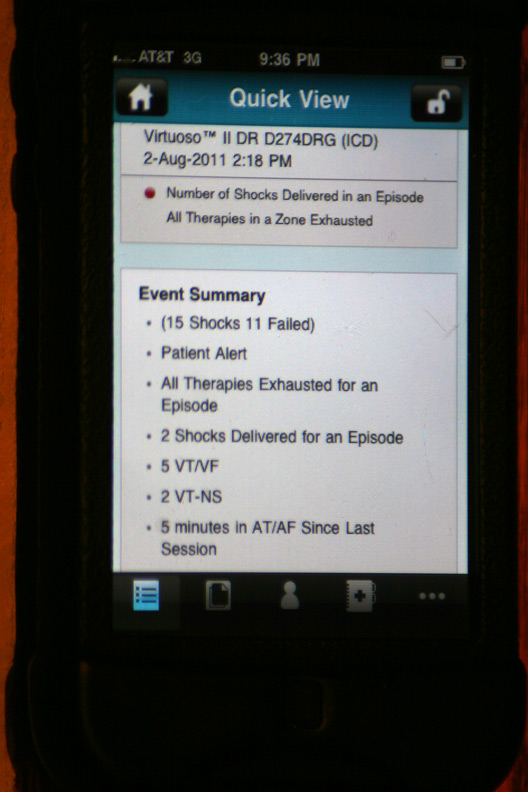

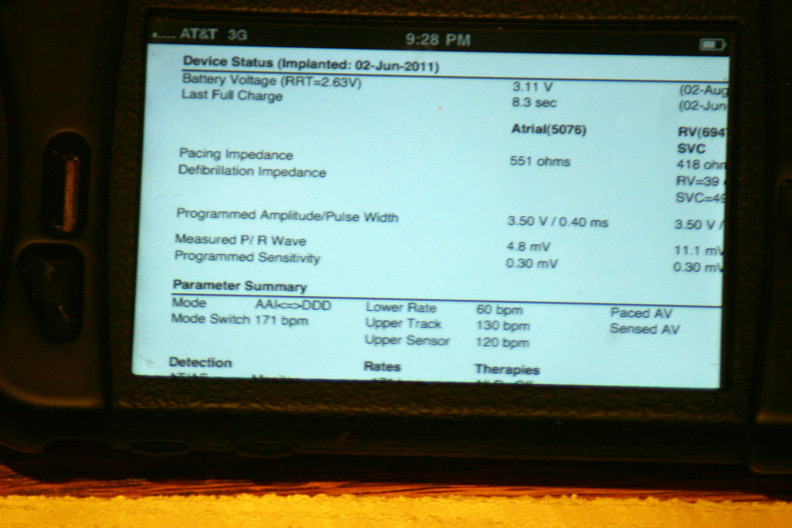
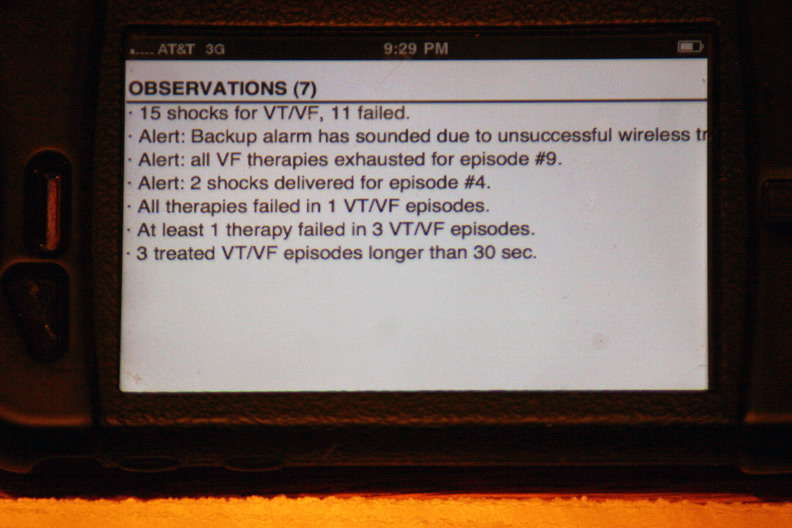
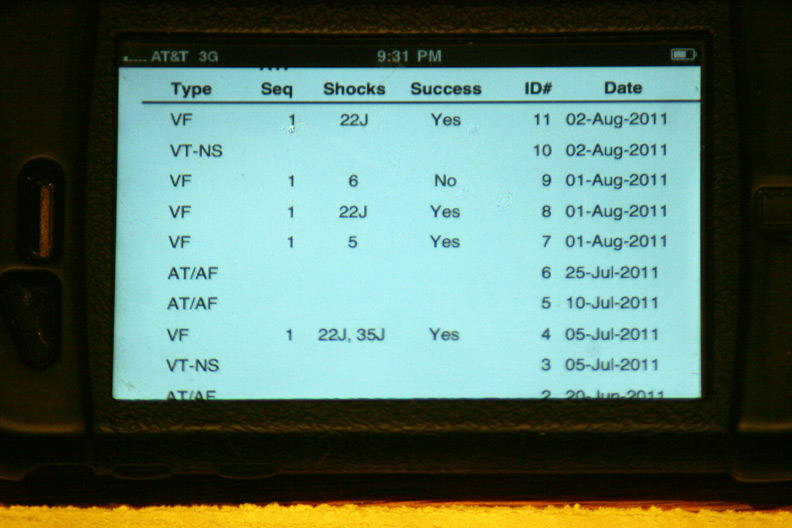
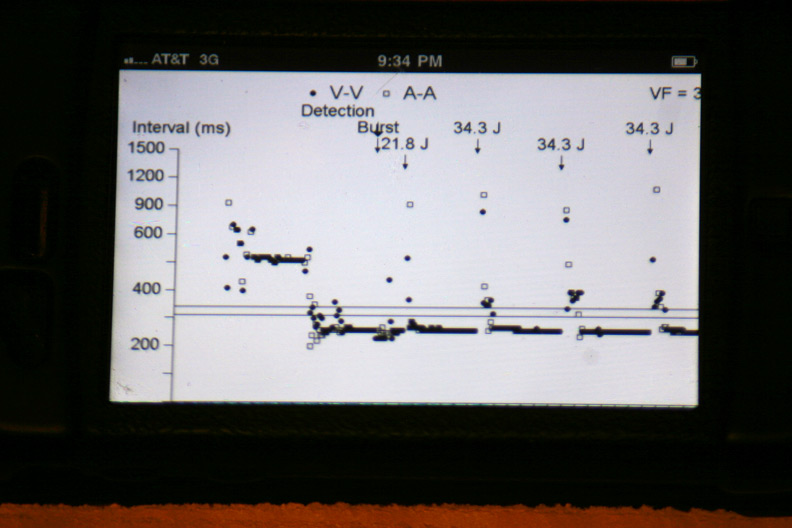

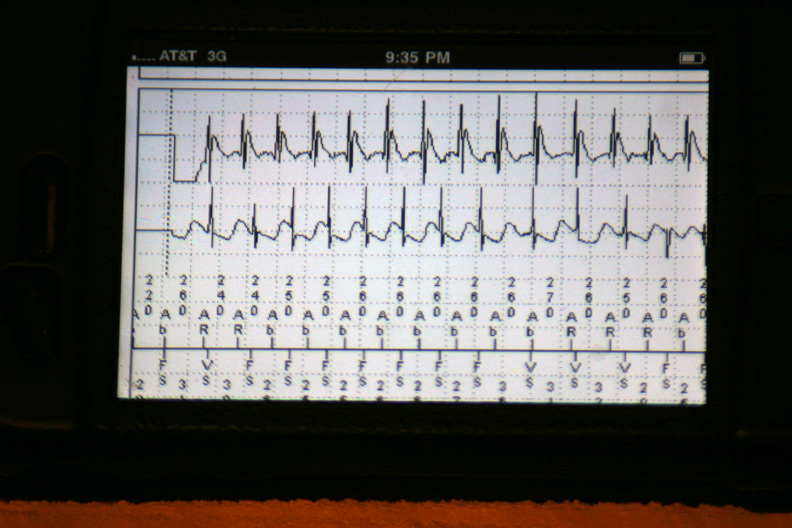
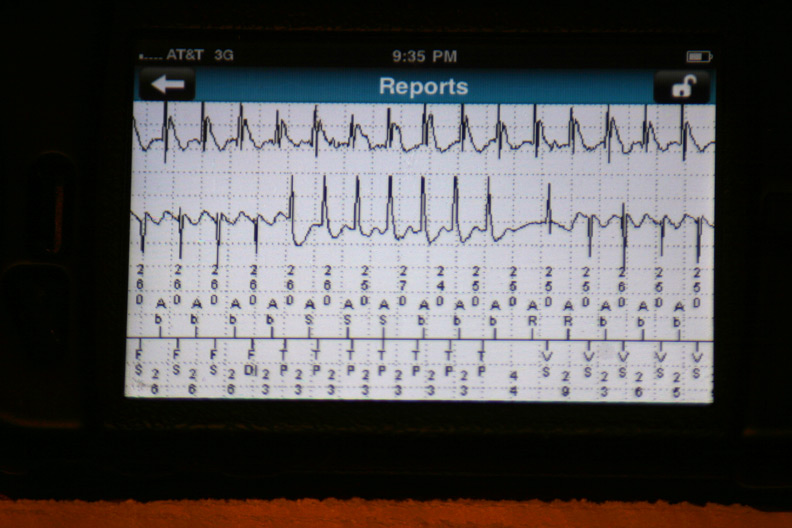
10 comments:
This is really great. The ability for physicians to get this kind of information can save the patient so much time and money.
In the future, you should take actual screen shots with the iPhone by holding down the home and power button on the top of the phone. That way we get to see much clearer shots of your screen, and it will just look better too!
Telemonitoring is effectively reducing patient's overall health costs. It's amazing how simple devices can close the gap between patients and doctors. If you had been on vacation at a sunny place, you could have quickly helped your patient anyway.
I was also going to say you should take screen shots. I imagine that if you take screen shots, you can then print your screen shots, too, if you are so inclined. Unprintable file? HA! (though you'd REALLY have to want to print it to go to the trouble of taking 45 screen shots and printing them out)
The previous two comments -- are you both selling something? --remote monitoring systems????
In this case, the remote system worked, absolutely. But it's not a panacea!
i would remove the times on the iphone screenshots - time is one of the 18 HIPAA identifiers... you don't want to be called by the gov. auditors for HIPAA violation...
I don't understand why you feel this important diagnostic session with your patient had to be done for free.
I would charge him the same fee as if you had done this in your office. You did the exact same thing you would have done there, no reason you shouldn't be able to bill the same.
I wouldn't be surprised if there isn't some sort of nonsensical regulatory hurdle that prevents the billing.
Don-
CMS Form 1500 (the electronic medical billing form) requires a service facility location to be documented where the care was provided (Box 32). Sadly, I suspect "internet" won't suffice as a valid location for payment and putting anything else could subject the physician to the potential for fraudulent billing, unless, of course, this service was performed from my office.
I agree that it's too bad you can't charge, & most patients would certainly agree, I think. (A co-pay for a phone consultation such as that one? no problem.) And if you can't charge for such a service, what are your eventual options?? gasp . . . concierge EPs??
"gasp . . . concierge EPs??"
Can they get me theater tickets, as well?
wonder why they can't at least set up a patient alert so patients can at least get easy checks on battery levels or how the leads are doing
Most fellow cyborgs I know took a while to notice they were beeping.
http://www.indiegogo.com/Diary-of-a-Cyborg?a=214128&i=addr
Post a Comment